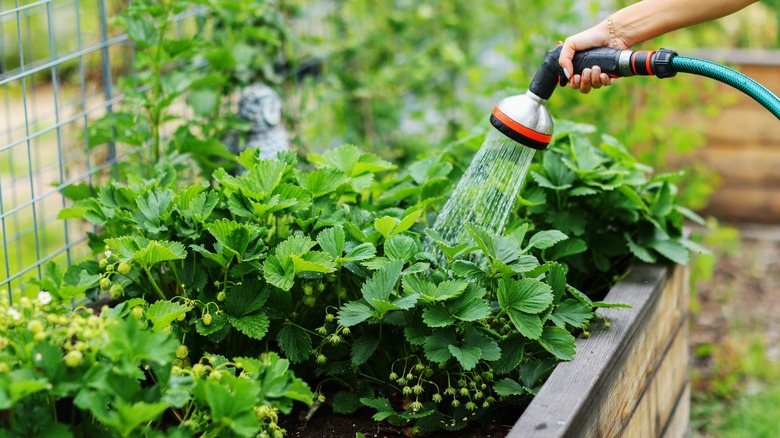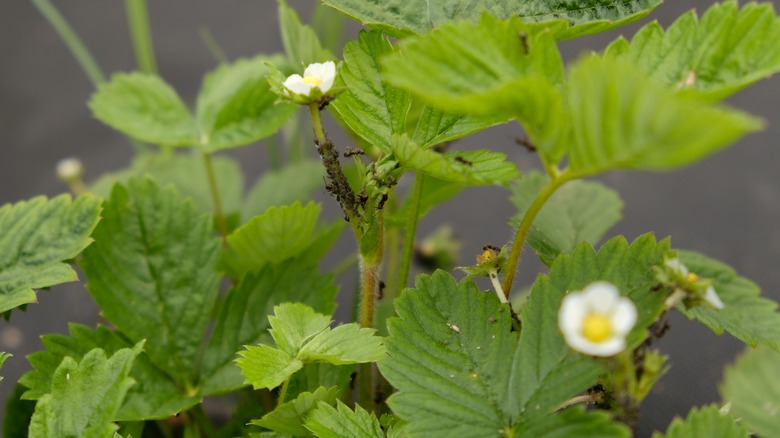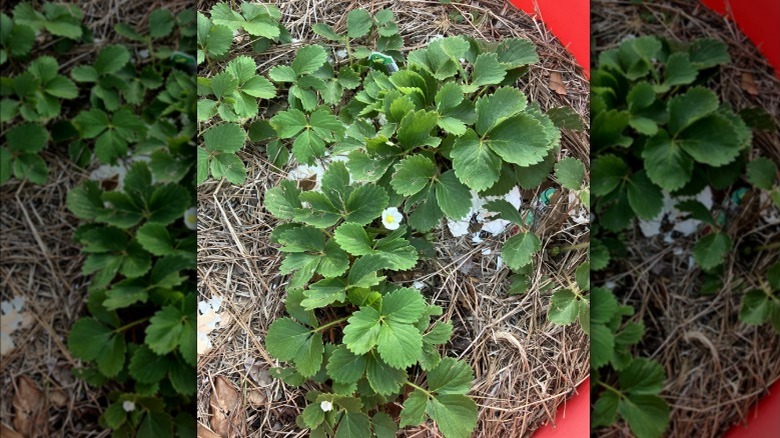Does A Sprinkle Of Sugar Really Grow Perfect Strawberries?
Strawberries are worth the work and patience needed to grow them. So, when a gardening hack arises that claims to grow them quicker, it's natural to be wary. If you're not careful, a misguided tip (like this infamous TikTok advice to use hardware cloth as an insect repellant) can damage or even kill your strawberries. One tip to add a teaspoon of sugar with water and dry yeast to fertilize your strawberries has been circling the internet.
Before trying it, consider what experts are saying; "While there are no major downsides to trying this trick, other solutions like homemade compost or worm tea will provide better nutrients for your plants and the soil, and have the added benefit of reducing your carbon footprint by recycling food waste," Hugh and Katie Finlay of Grow Great Fruit said exclusively to House Digest, noting these remedies often "don't cost a thing."
Because of its high nutrient content, some claim that yeast is a helpful addition to fertilize your plant as it grows and establishes roots. Yeast feeds on sugar, which suggests a grain of truth to this gardening method. However, most research about how yeast affects soil focuses on naturally occurring yeasts—not the dry yeast you can get at the grocery store. So, while sugar and yeast are not likely to harm your strawberry plant in such small amounts, a lack of harm does not equate to benefits for your plants. Thankfully, there are other natural options for amending your soil, according to Hugh and Katie Finlay. "To make sure you're not harming pollinators, use natural products like compost, worm castings, or manures, or use certified organic fertilizers applied following the instructions on the packaging."
Using sugar and yeast to turbocharge your strawberry plants may cause some setbacks
Despite little evidence to support sugar and yeast's ability to help strawberry plants grow, experts are quick to point out where this practice can go wrong. Speaking exclusively to House Digest, Foodie Gardener®, Award Winning Garden Designer, and T2 Diabetes Advocate, Shirley Bovshow warns, "While yeast might promote beneficial microbial activity in the soil, which could theoretically help plants, sugar can attract pests like ants or encourage fungal overgrowth." Plus, healthy plants create the sugar they need through photosynthesis, so anything more is excessive unless you're reviving a sick plant.
Yeast isn't totally harmless in this equation, either. When it's used alongside sugar, too much yeast can also support the growth of mold or other harmful fungi near your plants, per Bovshow, and the pair could create an imbalance of soil microorganisms and attract harmful insects, disrupting the ecosystem in your garden.
As the cherry on top, Bovshow also reveals that "Technically, the mix can not be classified as a 'fertilizer' as it would need to supply the major macronutrients, Nitrogen, Phosphorus, and Potassium, which it does not." When it comes to trying sugar and yeast as a soil amendment, the benefits simply don't outweigh the drawbacks.
Better tips for growing healthy strawberries
Although an official decision on whether or not a sugar and yeast mixture can be used to grow more prolific strawberry plants is yet to come, Hugh and Katie Finlay say it's better to support your plants with soil amendments that have already proven themselves. "We usually aim to feed our fruit using things that improve the health of both the soil and the plant as a whole. So we use composts, animal manures, green manures and companion planting (where other plants have a beneficial impact on your fruit), and other organic methods," the pair explained exclusively to House Digest. "In terms of soil conditions, strawberries like an acidic soil, so try mulching them with dry pine needles to increase the acidity – they love it."
Be sure you've also considered the best practices for growing your berries to achieve the best results. Generally speaking, spring is the best time to plant strawberries because it will give them a chance to put down roots and survive the growing season. The Finlays suggest you "work some compost and well-rotted animal manures through the soil a month or so before you plant them so they're getting the best start possible." Then, feed them as they begin to grow and produce fruit to ensure they continue to flourish with access to plenty of nutrients. Sticking to NPK fertilizers, which contain a specialized blend of nitrogen, phosphorus, and potassium — all minerals your strawberry plant needs to grow and establish its roots — will help strawberries survive the growing season.


